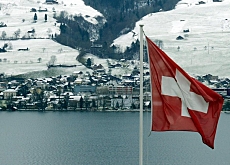Court strikes down Obwalden tax break for rich

The Swiss Federal Court has ruled that canton Obwalden's degressive tax system, aimed at attracting wealthy residents, is unconstitutional.
The country’s highest court said on Friday that degressive income taxes ran counter to constitutional measures designed to ensure taxation according to economic performance.
The ruling comes as Switzerland is involved in a separate tax disagreement with the European Union over its low corporate tax rates.
Obwalden had adopted a degressive income tax system which meant that the richer you are, the less you pay. Those earning over SFr300,000 ($233,000) per year, for example, had a tax rate as low as one per cent.
It was introduced in 2006 following a cantonal vote as a way of boosting the fortunes of Obwalden, one of the poorest cantons located in Switzerland’s mountainous centre.
Switzerland’s 26 cantons each have their own tax systems and can set their own levels.
But Obwalden’s decision was not welcomed by all, with opponents arguing the system was unfair.
Friday’s court ruling comes in response to a case brought by Communist parliamentarian Josef Zisyadis – who moved to Obwalden to oppose the tax charges – along with three other Obwalden residents, who argued that degressive tax was unconstitutional.
This view was shared by the court’s judges. It also means that canton Schaffhausen, the only other canton to have degressive tariffs, should also amend its tax rules.
“Fiscal cannibalism”
Reacting to the decision, Zisyadis was jubilant. “We have put a brake on the fiscal cannibalism between the cantons,” he commented.
“The Federal Court’s decision is extremely important, on the Swiss and European level,” said Zisyadis, adding that the ruling had shown Europe that Switzerland could find its own solutions to its problems.
For its part, the Obwalden cantonal government said in a short statement that it would now look into measures to find constitutionally compatible tax rates and that it would present a proposal to the cantonal parliament on the issue.
The finance ministry said that the court’s decision would neither change the system of tax competition between the cantons nor encourage tax harmonisation.
It emphasised that federalism and tax competition were essential parts of Swiss identity that also made the country more attractive for foreign companies.
But it added that the government had always rejected the degressive model.
Switzerland is currently embroiled in an ongoing spat with the EU over its low corporate tax rates. The EU believes that these levies offered in some Swiss cantons violate a 1972 free trade agreement, calling it a disguised state subsidy.
The Swiss authorities say the accusation is unfounded and have said that no contractual regulations exist between Switzerland – which is not a member of the EU – and Brussels on the harmonisation of company taxation.
swissinfo with agencies

More
Federal Court
In December 2005, 86 per cent of Obwalden’s citizens voted in favour of the degressive tax system. It came into force on January 1, 2006.
Rates sank for incomes above SFr300,000 and wealth of more than SFr5 million.
The canton also introduced a corporation tax of 6.6% and a drop in property tax of at least 30 per cent.

In compliance with the JTI standards
More: SWI swissinfo.ch certified by the Journalism Trust Initiative










You can find an overview of ongoing debates with our journalists here . Please join us!
If you want to start a conversation about a topic raised in this article or want to report factual errors, email us at english@swissinfo.ch.